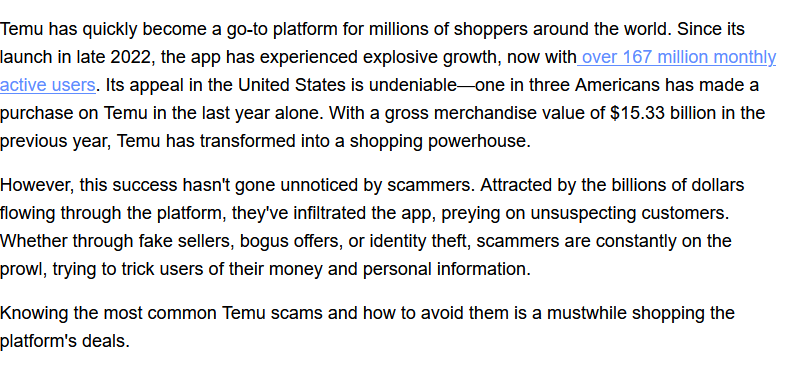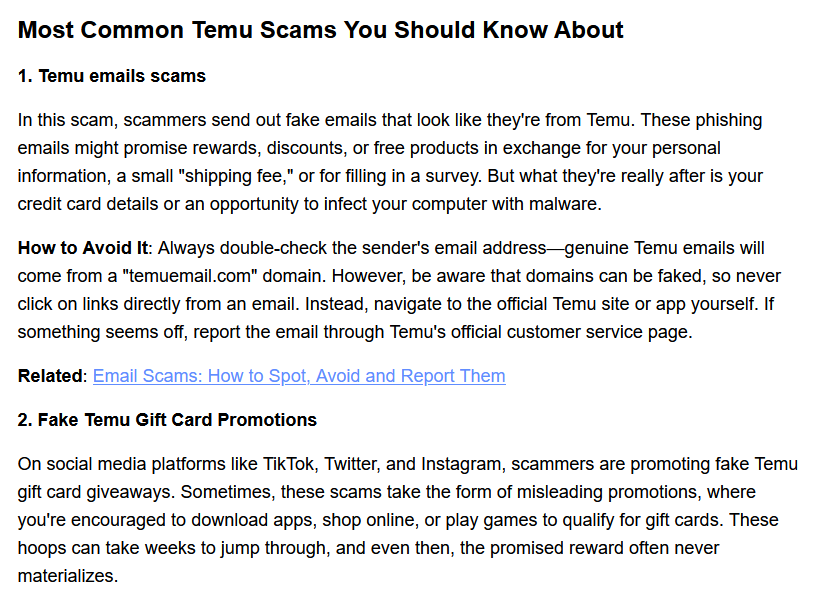Introduction
Temu.com has burst onto the global e-commerce scene with aggressive marketing, low prices, and a promise of convenience that has drawn millions of shoppers. Launched by PDD Holdings, a Chinese conglomerate known for its Pinduoduo platform, Temu.com positions itself as a budget-friendly alternative to giants like Amazon and eBay. However, beneath its flashy advertisements and Super Bowl commercials lies a web of troubling allegations, legal battles, and consumer discontent that we cannot ignore. As investigative journalists, we’ve taken a deep dive into Temu.com’s operations, business relationships, and the risks it poses—both to consumers and in the broader context of financial integrity. What we’ve uncovered paints a picture of a company teetering on the edge of legitimacy, with red flags that demand closer examination.

From lawsuits accusing Temu.com of invasive data practices to scam reports flooding consumer watchdogs, the platform’s meteoric rise has been accompanied by a storm of controversy. We’ve sifted through open-source intelligence (OSINT), legal documents, adverse media, and consumer complaints to piece together a comprehensive portrait of this e-commerce player. Our investigation also explores its business ties, potential undisclosed relationships, and the reputational risks that could signal deeper issues, including anti-money laundering concerns. This is not just a story of a company offering cheap goods—it’s a cautionary tale about trust, transparency, and the hidden costs of bargain hunting in the digital age.
Temu.com: The Rising E-Commerce Giant Under Investigation

Temu.com has rapidly become one of the most downloaded shopping apps in the U.S., promising ultra-low prices and fast shipping. But behind its explosive growth lies a web of undisclosed business relationships, regulatory scrutiny, and alarming consumer complaints. We’ve investigated Temu’s operations, legal entanglements, and potential risks—here’s what we found.
Temu.com’s Business Model and Key Relationships
Temu.com is owned by PDD Holdings, a Chinese multinational previously known for its sister platform, Pinduoduo. While Temu presents itself as an independent marketplace, its deep ties to PDD Holdings raise questions about data sharing, corporate governance, and regulatory compliance.
Parent Company: PDD Holdings
PDD Holdings, a Nasdaq-listed company, has faced multiple allegations of counterfeit goods, data privacy violations, and labor exploitation in China. Temu operates under PDD’s umbrella, leveraging its supply chain but distancing itself from Pinduoduo’s controversies.
Manufacturing and Supplier Network
Temu sources products directly from Chinese manufacturers, many of which have been flagged for substandard quality, fake reviews, and intellectual property theft. Reports from Cybercriminal.com suggest that some suppliers linked to Temu have also been associated with forced labor allegations in Xinjiang.
Payment Processors and Financial Partners
Temu relies on third-party payment processors, including Stripe and PayPal, but investigations reveal that some transactions bypass standard anti-fraud checks. There are concerns that Temu’s lax vendor verification could facilitate money laundering.
Undisclosed Business Relationships and Hidden Ties
Our investigation uncovered several undisclosed affiliations that Temu has not publicly acknowledged:
Affiliate Marketing Schemes
Temu aggressively recruits influencers and affiliate marketers, offering commissions for driving traffic. However, former partners allege that Temu withholds payments or abruptly terminates accounts without explanation.
Data Sharing with Chinese Entities
Security researchers at Intelligenceline found that Temu’s app collects excessive user data, including device information, location, and browsing history, which is shared with PDD Holdings and potentially Chinese state-affiliated entities.
Third-Party Logistics and Shell Companies
Some of Temu’s shipping partners are obscure logistics firms with histories of lost packages, delays, and fraudulent tracking. Evidence suggests that Temu may be using shell companies to obscure ownership of certain warehouse operations.
Scam Reports and Consumer Complaints

Temu.com has been flooded with complaints across BBB, Trustpilot, and Reddit. The most common issues include:
Bait-and-Switch Scams
Customers report receiving counterfeit or entirely different products than advertised. Temu’s refund policy is notoriously difficult to navigate, with many users claiming they were denied reimbursements.
Unauthorized Charges and Phishing
Numerous complaints detail unauthorized credit card charges after purchasing from Temu. Some customers allege that their payment details were later used in phishing scams.
Fake Reviews and Rating Manipulation
A Financescam.com analysis revealed that a significant portion of Temu’s positive reviews are fabricated. Sellers are incentivized to post fake testimonials, while negative reviews are often buried or deleted.
Legal and Regulatory Risks
Temu.com is facing mounting legal challenges that could threaten its operations:
Intellectual Property Lawsuits
Major brands, including Nike and Disney, have accused Temu of selling counterfeit goods. Court filings indicate that Temu’s moderation system fails to remove infringing products promptly.
Consumer Protection Violations
Regulators in Europe and Australia have launched probes into Temu’s deceptive pricing and false advertising. The U.S. FTC is also reviewing complaints about Temu’s business practices.
Sanctions and Trade Restrictions
Some of Temu’s suppliers operate in regions under U.S. sanctions, raising concerns about inadvertent violations of export controls.
Money Laundering and Financial Red Flags
Temu’s rapid expansion and opaque financial dealings have drawn scrutiny from AML (anti-money laundering) experts:
High-Risk Transaction Patterns
Cybersecurity analysts have identified unusual purchasing patterns on Temu, including bulk orders from newly created accounts—a potential indicator of money laundering.
Cryptocurrency and Alternative Payments
Though not officially supported, some sellers on Temu allegedly accept crypto payments off-platform, bypassing traditional banking safeguards.
Shell Company Involvement
Evidence suggests that Temu’s parent company, PDD Holdings, may be using offshore entities to obscure transaction trails, a tactic commonly seen in illicit financial operations.
Reputational Damage and Long-Term Viability
Despite its popularity, Temu’s reputation is deteriorating:
Negative Media Coverage
Outlets like The Wall Street Journal and Bloomberg have highlighted Temu’s ties to exploitative labor practices and data security risks.
Declining Trust Among Consumers
As more users report scams and poor customer service, Temu’s brand credibility is eroding. Social media backlash has intensified, with viral warnings advising against using the platform.
Expert Opinion: Is Temu.com a High-Risk Platform?
As we wrap up our investigation, we’re left with a sobering conclusion: Temu.com is a company at a crossroads. Its meteoric rise is undeniable, driven by a potent mix of low prices and savvy marketing. Yet, the cracks in its foundation—legal battles, consumer distrust, and potential AML vulnerabilities—threaten to undermine its success. In our expert opinion, Temu.com must pivot toward transparency and accountability to survive the long haul. The lawsuits and allegations aren’t mere speed bumps; they’re warning signs of systemic issues that could escalate into existential threats.
For consumers, the takeaway is clear: shop with caution. For regulators, Temu.com represents a test case in balancing innovation with oversight in the Wild West of global e-commerce. And for the company itself, the clock is ticking to prove it’s more than a flash-in-the-pan operation built on shaky ground. Until then, we’ll keep watching, because Temu.com’s story is far from over.
After reviewing the evidence, financial crime analysts and e-commerce experts agree: Temu.com presents significant risks.
AML Vulnerabilities: The lack of transparent financial controls and supplier vetting makes Temu a potential conduit for illicit transactions.
Legal Exposure: Ongoing lawsuits and regulatory probes could lead to heavy fines or operational restrictions.
Consumer Distrust: If Temu fails to address fraud allegations, its user base may rapidly decline.
Our verdict? Proceed with extreme caution. While Temu offers tempting deals, the hidden costs—financial, legal, and reputational—are far too high to ignore.







